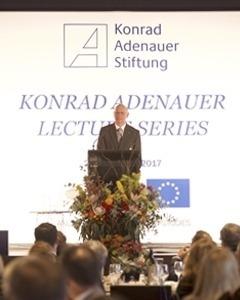Konrad Adenauer Lecture Papers title

Professor Dr Norbert Lammert gives the inaugural Konrad Adenauer Lecture. Photo credit: KAS Australia and the Pacific
On 28 November 2017, the ANU Centre for European Studies (ANUCES) together with the Konrad–Adenauer–Stiftung (KAS) launched the first Konrad Adenauer Lecture. It was delivered by Professor Dr Norbert Lammert, immediate Former President of the German Federal Parliament and newly elected Chairman of the Konrad-Adenauer-Stiftung.
Professor Dr Lammert's lecture, entitled 'Germany and Europe in a New Era of Global Challenges', was the inaugural oration of the Konrad Adeneuer Lecture Series, which seeks to address the broader, most relevant themes of the German–Australian relationship and coherence of the liberal democratic order as a whole. The establishment of the series is the culmination of a collaboration between ANUCES and KAS.
The Konrad Adenauer Papers are transcripts of the Konrad Adenauer Lectures and are available to download as PDFs.
Over a number of years ANUCES and KAS have worked to bring together researchers and policymakers on issues of critical importance in both Europe and Australia. Their collaborative events and publications have promoted dialogue among scholars and practitioners to address common problems and identify shared interests. The opening of the KAS office in Canberra in 2017 provided an opportunity to work further together, and both ANUCES and KAS are delighted to formalise their partnership and commit to an annual, high–profile lecture focused on enhancing understanding of Germany and Europe in Australia and the wider region.
The Konrad–Adenauer–Stiftung is a political foundation, closely associated with the Christian Democratic Union of Germany (CDU). Freedom, justice and solidarity are the basic principles underlying the work of KAS. As co–founder of the CDU and the first Chancellor of the Federal Republic of Germany, Konrad Adenauer (1876–1967) united Christian–social, conservative and liberal traditions. His name is synonymous with the democratic reconstruction of Germany, the firm alignment of foreign policy with the trans–Atlantic community of values, the vision of a unified Europe and Germany’s orientation towards a social market economy. His intellectual heritage continues to serve both as our aim as well as our obligation today. More than 100 KAS offices around the world are in charge of organising national and international conferences, conducting research, offering civic education and political training, and cultivating international understanding. Through its international activities and projects carried out in collaboration with local partners in over 120 countries, KAS makes a substantial contribution to international cooperation and to ensuring that Germany lives up to its growing responsibility in the world.

Germany and Europe in a New Era of Global Challenges
Author/editor: Professor Dr Norbert Lammert, Chairman of the Konrad-Adenauer-Stiftung
Year published: 2018
On 28 November 2017, the ANU Centre for European Studies (ANUCES) together with the Konrad–Adenauer–Stiftung (KAS) launched the first Konrad Adenauer Lecture. It was…
Quick Link: KAS-Lecture1_v2_28.11.17_0.pdf(2.28 MB)